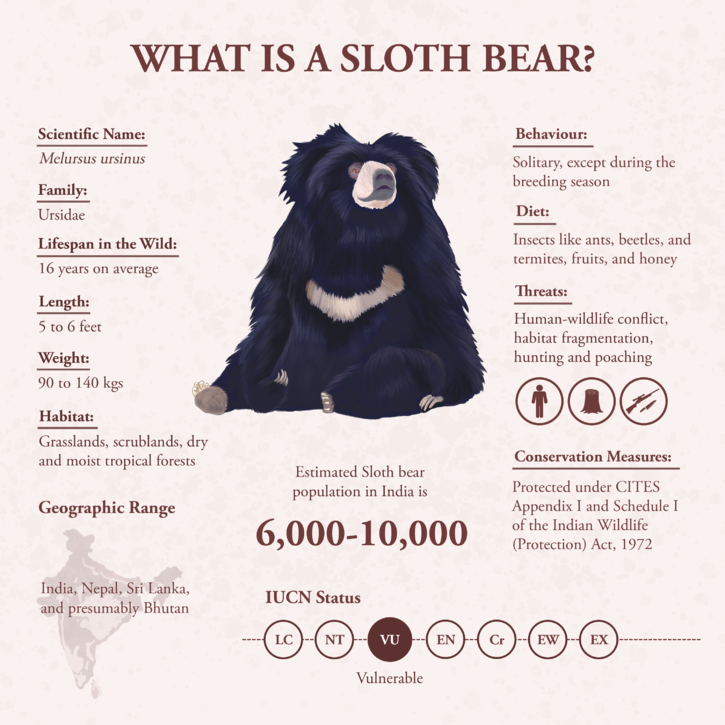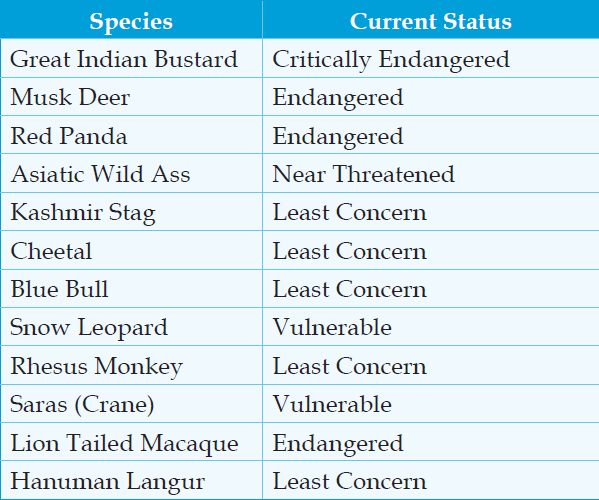Important Facts For Prelims
World Sloth Bear Day
- 13 Oct 2022
- 4 min read
Why in News?
The first World Sloth Bear Day was observed on October 12, 2022 to generate awareness and strengthen conservation efforts around the unique bear species endemic to the Indian subcontinent.
- It was proposed by Wildlife SOS India, an organisation involved in sloth bear conservation and protection for over two decades and the (International Union for Conservation of Nature) IUCN-Species Survival Commission (SSC) sloth bear expert team accepted and declared the day to be celebrated worldwide.
What is Sloth Bear?
- About:
- Sloth Bear is one of the 8 bear species found across the globe.
- Sloth bears primarily eat termites and ants, and unlike other bear species, they routinely carry their cubs on their backs.
- They are also very fond of honey, hence their alternative name of “honey bear”.
- Sloth bears do not hibernate.
- They are agile and considered one of the most formidable wild animals.
- They are also known as the least researched bear species.
- Scientific Name: Melursus Ursinus.
- Habitat: Presently Sloth bears are only found in the Indian subcontinent, Nepal and a sub-species in Sri Lanka.
- About 90% of the global Sloth Bear population is found in India.
- Conservation Status:
- IUCN Red List: Vulnerable.
- Wildlife protection Act (1972): Schedule I.
- Convention on International Trade in Endangered Species (CITES): Appendix I.
- Threats:
- An ethnic group named Kalandars, who were mostly poor performed a practice known as a dancing bear, where the captured sloth bears are tortured to make them dance.
- According to several reports, their population has dropped by 40 to 50% over the last three decades mainly due to habitat loss, habitat fragmentation, poaching and increasing human-bear conflict.
- Conservation efforts:
- The Wildlife SOS Bear rescue centres are rescuing Sloth bears and reintroducing them to their natural habitat where they also received veterinary care.
- Further, to ensure the Kalandar community did not fall back on poaching wild animals for a living, Wildlife SOS worked with the Kalandars to provide them with alternative forms of livelihood and access to education.
- Through the declaration of World Sloth Bear Day, Wildlife SOS and the IUCN-SSC, (Species Survival Commission) Sloth Bear Expert Team aim to set precedence for the rest of the world to promote the conservation of Sloth bears and their habitats throughout their distribution range.
UPSC Civil Services Examination Previous Year Question (PYQ)
Prelims
Q. Which one of the following groups of animals belongs to the category of endangered species? (2012)
(a) Great Indian Bustard, Musk Deer, Red Panda and Asiatic Wild Ass
(b) Kashmir Stag, Cheetal, Blue Bull and Great Indian Bustard
(c) Snow Leopard, Swamp Deer, Rhesus Monkey and Saras (Crane)
(d) Lion-tailed Macaque, Blue Bull, Hanuman Langur and Cheetal
Ans: (a)
Exp:






